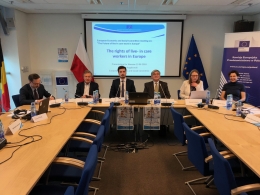European Economic
and Social Committee
Subscribe
Main navigation
-
Dwarna
ABOUT
The European Economic and Social Committee (EESC) is the voice of organised civil society in Europe.
Find out more about its role and structure at http://www.eesc.europa.eu/en/about
- Organizzazzjoni politika
- Organizzazzjoni amministrattiva
- KOOPERAZZJONI MA’ ISTITUZZJONIJIET OĦRA
- Regoli
-
Il-ħidma tagħna
OUR WORK
The EESC issues between 160 and 190 opinions and information reports a year.
It also organises several annual initiatives and events with a focus on civil society and citizens’ participation such as the Civil Society Prize, the Civil Society Days, the Your Europe, Your Say youth plenary and the ECI Day.
Find the latest EESC opinions and publications at http://www.eesc.europa.eu/en/our-work/opinions-information-reports/opinions and http://www.eesc.europa.eu/en/our-work/publications-other-work/publications respectively.
- Opinjonijiet u rapporti ta’ informazzjoni
- Dokumenti
- Pubblikazzjonijiet u ħidma oħra
-
Soċjetà ċivili u parteċipazzjoni taċ-ċittadini
- European elections 2024
- Civil Society Week 2024
- Premju tas-Soċjetà Ċivili
- The Conference on the Future of Europe
- Ġranet tas-Soċjetà Ċivili
- Passaport Demokratiku Ewropew
- L-Ewropa Tiegħek, Leħnek
- Inizjattiva taċ-Ċittadini Ewropej
- The path to our industrial future
- Round Tables taż-Żgħażagħ dwar il-Klima u s-Sostenibbiltà
- Premjijiet tal-UE għall-Produzzjoni Organika
- Civil Society Against COVID-19
- Il-KESE jappoġġja lill-Ukrajna
- Sħubijiet
- Relazzjonijiet mal-Kunsilli Ekonomiċi u Soċjali
-
Politiki
POLICIES
The EESC is active in a wide range of areas, from social affairs to economy, energy and sustainability.
Learn more about our policy areas and policy highlights at http://www.eesc.europa.eu/en/policies
-
Oqsma ta’ politika
- Agrikoltura, Żvilupp Rurali u Sajd
- Azzjoni klimatika
- Politika ta’ koeżjoni, reġjonali u urbana
- Konsumaturi
- Tibdil diġitali u soċjetà tal-informazzjoni
- Unjoni ekonomika u monetarja
- Edukazzjoni u taħriġ
- Xogħol
- Enerġija
- Intrapriża
- Ambjent
- Relazzjonijiet esterni
- Servizzi finanzjarji u swieq tal-kapital
- Drittijiet fundamentali u taċ-ċittadini
- Industrija u bidliet industrijali
- Affarijiet istituzzjonali u baġit tal-UE
- Migrazzjoni u ażil
- Riċerka u innovazzjoni
- Servizzi ta’ interess ġenerali
- Suq Uniku
- Affarijiet soċjali
- Żvilupp sostenibbli
- Tassazzjoni
- Trasport
-
Oqsma ta’ politika
-
Aġenda
AGENDA
The EESC holds nine plenary sessions per year. It also organises many conferences, public hearings and high-level debates related to its work.
Find out more about our upcoming events at http://www.eesc.europa.eu/en/agenda/our-events/upcoming-events
- L-avvenimenti tagħna
-
Aħbarijiet u media
NEWS & MEDIA
Here you can find news and information about the EESC'swork, including its social media accounts, the EESC Info newsletter, photo galleries and videos.
Read the latest EESC news http://www.eesc.europa.eu/en/news-media/news and press releases http://www.eesc.europa.eu/en/news-media/press-releases
- President
-
Membri u Gruppi
MEMBERS & GROUPS
The EESC brings together representatives from all areas of organised civil society, who give their independent advice on EU policies and legislation. The EESC's326 Members are organised into three groups: Employers, Workers and Various Interests.
Find out more about our Members and groups at http://www.eesc.europa.eu/en/members-groups
- Membri
- Gruppi
-
Sezzjonijiet u Korpi Oħra
SECTIONS & OTHER BODIES
The EESC has six sections, specialising in concrete topics of relevance to the citizens of the European Union, ranging from social to economic affairs, energy, environment, external relations or the internal market.
Find out more at http://www.eesc.europa.eu/en/sections-other-bodies
-
Sezzjonijiet / Kummissjoni
- Unjoni Ekonomika u Monetarja u Koeżjoni Ekonomika u Soċjali (ECO)
- Suq Uniku, Produzzjoni u Konsum (INT)
- Trasport, Enerġija, Infrastruttura u Soċjetà tal-Informazzjoni (TEN)
- Xogħol, Affarijiet Soċjali u Ċittadinanza (SOC)
- Agrikoltura, Żvilupp Rurali u Ambjent (NAT)
- Relazzjonijiet Esterni (REX)
- Kummissjoni Konsultattiva dwar il-Bidliet Industrijali (CCMI)
- Osservatorji
- Oħrajn
-
Sezzjonijiet / Kummissjoni
- Ukraine









